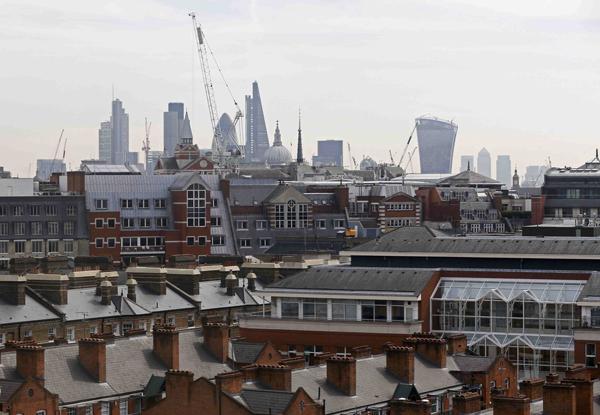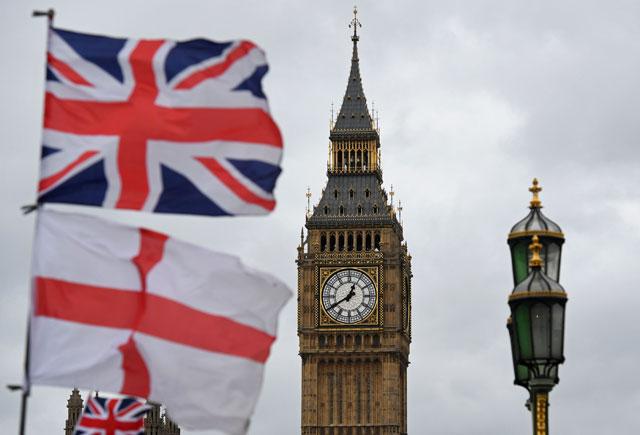You are here
UK's Osborne warns voters of Brexit's permanent economic damage
By Reuters - Apr 18,2016 - Last updated at Apr 18,2016
LONDON — British Finance Minister George Osborne told voters that leaving the European Union (EU) would do permanent damage to the country's economy, costing them thousands of pounds a year and sapping funding for public services.
In a move immediately challenged by anti-EU campaigners, Osborne pointed to treasury figures which said breaking away could cost each household £4,300 ($6,100) a year by 2030 .
Three days after official campaigning began for the EU membership referendum on June 23, Osborne said all alternatives to staying in the union would leave Britain's economy smaller than would be if it stayed in the world's biggest trading bloc.
Leading institutions, such as the International Monetary Fund, and economists have also warned about the short-term economic harm a so-called Brexit could cause. But they have been more reticent about the longer-term effect.
"Britain would be permanently poorer if it left the European Union. Under any alternative, we'd trade less, do less business and receive less investment," Osborne said as he homed in on what a Brexit could mean for voters and their living standards.
"The price would be paid by British families. Wages would be lower and prices would be higher," he said in a speech at a research centre specialising in composites for the aerospace industry, which has deep ties with other EU countries.
A poll last week showed just how sensitive voters are to what a Brexit meant for their own finances. Pollster YouGov said respondents who were evenly split shifted to 45-36 per cent in favour of staying in the EU if they were told that the cost of a Brexit for them would be 100 pounds a year.
Most opinion polls show the rival campaigns running neck and neck, although one published on Monday showed the "In" campaign had kept a 7 percentage-point lead.
Canada-style deal
Brexit supporters accuse Prime Minister David Cameron and Osborne of running a scare campaign. They say a post-EU Britain would flourish as it pursued its own trade deals and cut back on rules and regulations.
The Vote Leave campaign group raised one of the issues that has fuelled much of the opposition to EU membership in Britain, highlighting assumptions in the treasury's report that migration to Britain would remain unchanged in coming years.
But Osborne focused on the economy, saying that even the least disruptive Brexit option for Britain studied by his ministry — a deal with the EU similar to Norway's access to the bloc's single market — would mean national output would be nearly 4 per cent smaller by 2030 than if it stayed in.
One of the leading "Out" campaigners, London Mayor Boris Johnson, has sketched out a different future for Britain. He points to the trade deal reached by Canada with the bloc as a way for Britain to stop contributing to the EU budget and end its obligation to keep its borders open to all EU workers.
Osborne, a rival of Johnson's for the future leadership of the Conservative Party, said that kind of deal would not cover Britain's huge services industry and would leave the economy 6.2 per cent smaller by 2030, or £4,300 per household.
That would lower tax revenues by £36 billion a year, the same as the security and justice budgets combined, he said.
His calculations of the income loss for voters were based on the value of the estimated growth shortfall divided among Britain's roughly 27 million households. "Out" campaigners accused the government of resorting to unreliable estimates.
"Few forecasts are right for 14 months, let alone 14 years. Such precision is spurious, and entirely unbelievable," a former finance minister, Norman Lamont, said in a statement published by the Vote Leave group.
Related Articles
LONDON –– British finance minister George Osborne said on Sunday that homeowners would face a "significant hit" from lower house prices and
LONDON — The majority of British aerospace, defence, security and space companies believe that the country should stay in the European Union
LONDON — Britain must secure control over immigration in divorce negotiations with the European Union, Stephen Crabb, the first candidate to














